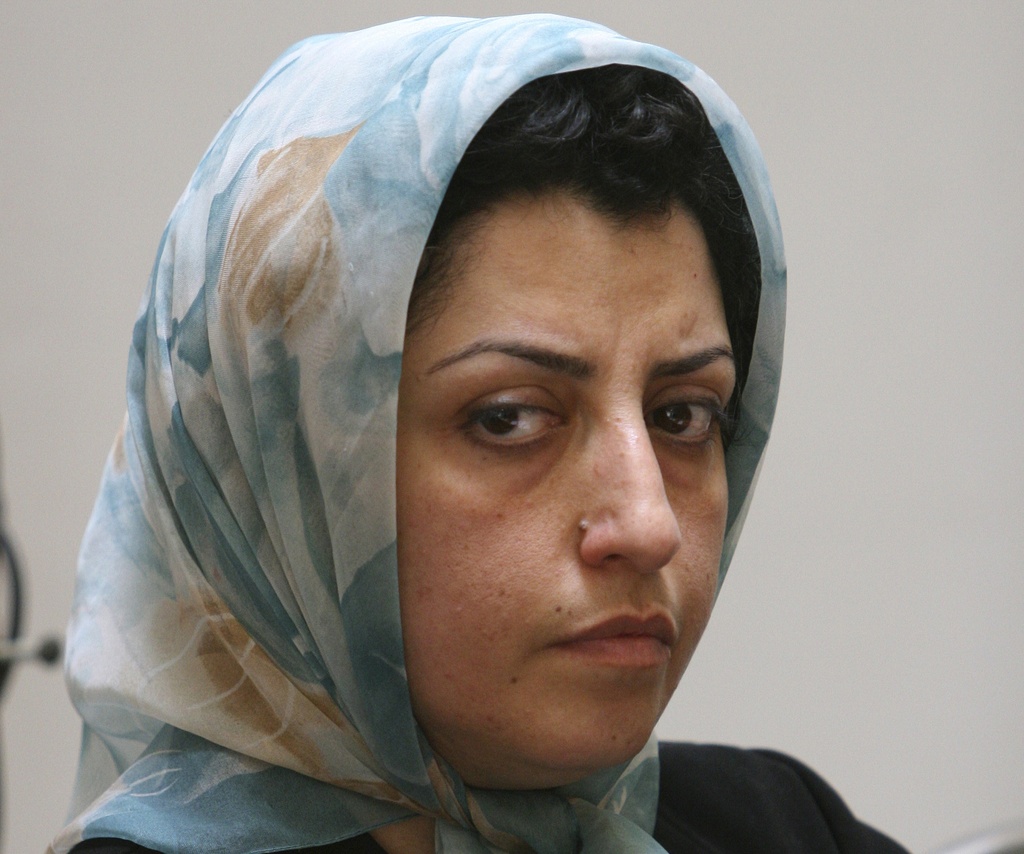
Jailed Iranian activist Narges Mohammadi, who was awarded the 2023 Nobel Peace Prize last month for her advocacy for women’s rights and freedom of expression in her country, began a hunger strike on Monday while already dealing with heart and lung issues in Tehran’s Evin prison, where she has been held since 2021.
The 51-year-old, whose family says she is in need of an emergency hospital transfer for urgent medical care, has been forbidden from leaving the prison because of her refusal to wear a hijab, her family said in a statement posted to social media last week.
Mohammadi’s hunger strike, according to another statement from her family on Monday, is meant to protest the “delaying and neglecting” of medical care for sick inmates as well as the mandatory hijab policy for women.
“[Iran] is responsible for anything that happens to our beloved Narges,” Mohammadi’s family said. Her husband told reporters that Mohammadi, who has suffered health problems including a heart attack in prison, plans to refuse dry food and only drink water with sugar or salt.
Read More: Iranian Women Are Still Fighting
Berit Reiss-Andersen, the chair of the Norwegian Nobel Committee, said in a statement on Monday that the organization is “deeply concerned” about Mohammadi’s health.
“The requirement that female inmates must wear a hijab in order to be hospitalized is inhumane and morally unacceptable,” Reiss-Andersen said, urging the Iranian authorities to provide necessary medical assistance to Mohammadi and other female inmates.
Mohammadi, the deputy head of non-governmental organization Defenders of Human Rights Center, has been in and out of jail over the last decade for charges including spreading anti-state propaganda.
When she was awarded the Nobel Peace Prize in October, Mohammadi told the New York Times in a written statement that she hoped the recognition would make Iran’s protest movement stronger and more organized. “Victory is near,” she said.
Women in Iran have long been subjected to scrutiny—from what they wear to who they socialize with. Tensions recently came to a head after the death of 22-year-old Mahsa Amini in September 2022, who was arrested by the country’s “morality police” for allegedly wearing her hijab improperly. Tens of thousands of protesters took to the streets calling for justice for Amini and condemning the country’s oppression of women.
Read More: Women of Iran: TIME’s 2022 Heroes of the Year
While Iran was swept by the unprecedented wave of protests, Mohammadi wrote an essay in the Times detailing how she and her fellow inmates staged their own solidarity events in prison.
Despite the historic unrest, authorities have doubled down on the hijab policy, which has come to symbolize the theocratic regime’s conservatism. In July, the country’s morality police resumed its patrols and enforcement of the hijab rule, after a monthslong suspension in the wake of Amini’s death. Then, in September, Iran’s parliament passed a bill that imposes heavier penalties for women who refuse to wear the hijab, with sentences of up to 10 years in prison for activists who protest against it.
Meanwhile, women continue to face serious threats from conservative groups and authorities that have sometimes turned deadly. Just last month, a 16-year-old died after collapsing in a subway car in Tehran; she was allegedly assaulted by the morality police for not wearing a hijab. And in March, over 100 people were arrested for the suspected poisoning of thousands of school girls across the country, which activists allege was perpetrated by religious groups that object to girls’ education.
Mohammadi is the second Iranian woman to be awarded the Nobel Peace Prize—after Shirin Ebadi, founder of the Defenders of Human Rights Center, in 2003—and the fifth person to receive the prize while in prison or under house arrest. Among the four other incarcerated laureates, two—German journalist Carl Von Ossietzky and Chinese activist Liu Xiaobo—died in captivity.
More Must-Reads From TIME
- The 100 Most Influential People of 2024
- Coco Gauff Is Playing for Herself Now
- Scenes From Pro-Palestinian Encampments Across U.S. Universities
- 6 Compliments That Land Every Time
- If You're Dating Right Now , You're Brave: Column
- The AI That Could Heal a Divided Internet
- Fallout Is a Brilliant Model for the Future of Video Game Adaptations
- Want Weekly Recs on What to Watch, Read, and More? Sign Up for Worth Your Time
Contact us at letters@time.com